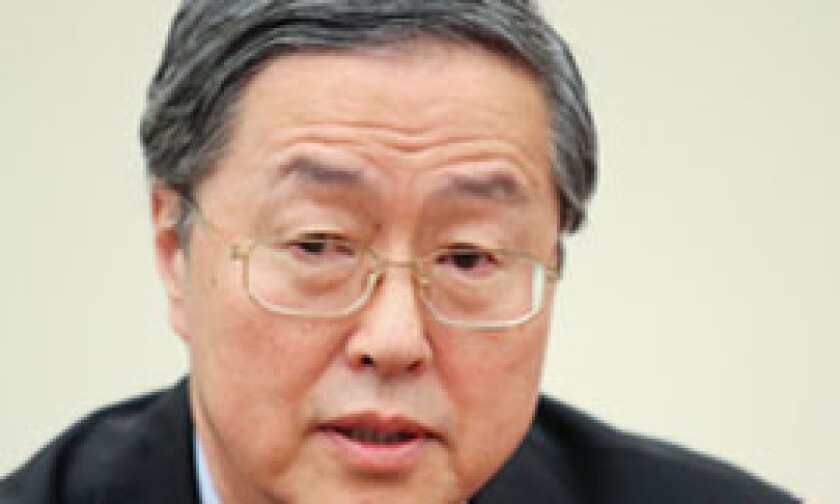"We are in a trade war, we are in a currency war we are in [capital] tax intervention war and we are in Q.E. [quantitative easing ]war," NYU economist Nouriel Roubini told Emerging Markets in an interview. These conflicts are "symptoms of the same problem of a vast disagreement about what needs to be done" to fix the broken global monetary system, he said.
This weekend’s annual meeting of the IMF pitted China against the US and Europe, as the west piled pressure on Beijing for a revaluation of its currency, the yuan. Fears are mounting that the failure of advanced economies to boost export competitiveness – which would require China to strengthen the yuan – will derail the fragile economic recovery.
The fault lines in the global monetary system became clear this weekend, as countries brushed off demands to coordinate economic policies in the common global interest. The artificially low value of the yuan has given an unfair advantage to Chinese goods, squeezing out US and European exports, the US and IMF argued.
"There is no way to believe that global growth could be rebalanced without changing some currency value," said IMF chief Dominique Strauss-Kahn on Saturday.
People’s Bank of China governor Zhou Xiaochuan yesterday resisted demands to accelerate the pace of China’s currency appreciation, arguing the move would fail to correct trade imbalances while threatening to destabilize China’s economy.
As China's economy expands and low inflation is anchored, "the currency would become stronger and stronger," Zhou said at a meeting of the International Institute of Finance in Washington.
"The IMF must strengthen its surveillance of exchange-rate policies and reserve accumulation practices," US treasury secretary Timothy Geithner told the IMF’s ministerial steering committee this weekend.
The stand-off between China and western powers has highlighted the Fund’s impotence as countries unilaterally impose short-term economic policies that undermine prospects for a sustainable economic recovery, said Ousmene Mandeng, head of public sector investment advisory at Ashmore Investment.
Roubini said the IMF was little more than an ineffective talking shop and suggested the World Trade Organization’s powers should be enhanced to allow it to impose penalties on countries with trade surpluses. An appreciation of the Chinese currency would rebalance global growth, he said. The resulting depreciation of the euro and dollar, in trade-weighted terms, would boost the west’s export competitiveness.
Without yuan appreciation, the west would likely face deflationary pressure, increasing the public and private debt burdens, Roubini said.
As US unemployment remains stubbornly high, the political pressure on China is rising. Last month, the US House of Representatives passed a bill that could see China penalised for "currency manipulation".
An accelerated pace of currency appreciation in China would create "pain" and "complications" that would destabilize the global production cycle, said Li Daokui, an economist at Beijing’s Tsinghua University and a member of the People’s Bank of China’s monetary policy committee.
Li argued that the US was dumping all its economic problems on China while failing to resolve imbalances in its own economy. He said that China has undertaken structural measures to retool goods and services industries towards the export sector, while higher real value of wages are boosting domestic consumption.
Emerging market nations across Latin America are resisting currency appreciation, fearing a precipitous loss in market share to China. By contrast, renminbi revaluation would allow emerging economies to appreciate their currencies and boost domestic demand, said Chilean finance minister Felipe Larrain.
China’s refusal to appreciate its currency is diverting capital to neighbouring economies and forcing rapid interventions in the foreign exchange markets, leading to dollar accumulation, said Larrain.
With no fiscal space to power economic growth, the burden has fallen on monetary policy in the west. Roubini said the US Federal Reserve, through its credit easing policies, is attempting to devalue the dollar to boost export competitiveness. The global liquidity unleashed by Western central banks has also led to overwhelming capital flows which threaten to overwhelm emerging nations, he added.
